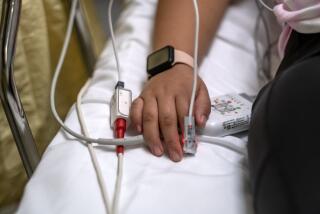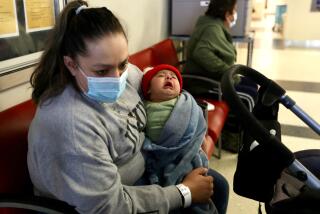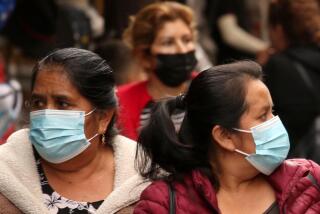It’s That Time of Year Again: Blood Supply Is Low
A seasonal drop in blood donors has at least one Orange County hospital considering temporarily banning elective surgery. But officials at other hospitals say they saw the crunch coming and were able to stockpile enough supplies.
American Red Cross officials put out a call for blood donors to help compensate for what has become an annual ebb in supplies tied to the holidays, when people become too busy to give blood, and flu season, when illness precludes others from donating.
Officials at most Orange County hospitals said supplies are low but still sufficient for scheduled medical procedures.
But surgeons at Saddleback Memorial Medical Center in Laguna Hills could be asked in the next few days to postpone some nonemergency surgeries. Doctors there were to decide this morning whether to go through with one scheduled elective heart operation, said hospital spokeswoman Jennifer D’Andrea.
Supplies of O positive and O negative were extraordinarily low, she said.
“O-positive, we usually have about 30 units; now we’re down to 13,” she said. “O-negative is the one we’re really low on. We only have enough for trauma cases, only a few units. . . . We haven’t made it mandatory for doctors that they cancel elective surgeries, but we’re recommending that they consider how the blood is used.”
Hospital officials are planning a blood drive for later this month, she said, though details had not been firmed up.
The problem appeared to be more acute in Los Angeles County, where Red Cross officials said blood levels were at a 21-year low.
On Monday and Tuesday, six nonemergency surgeries at Los Angeles hospitals were postponed for a few hours because of a lack of available blood, said Ross Herron, medical director of the American Red Cross Blood Services, Southern California Region.
At Kaiser Foundation Hospital on Sunset Boulevard, blood supplies are 20% of their normal levels, officials said. On Monday, at least four nonemergency surgeries were postponed for a few hours because blood was not immediately available.
“We’re used to shortages that would last two to three days,” said Dr. Joseph Thompson, who oversees the hospital’s transfusion services. “But this is a different order of magnitude for us.”
Stocks of some types of blood were out Tuesday morning at the Red Cross’s Koreatown office, Herron said. The Red Cross, one of several suppliers used by most Southern California hospitals, typically tries to provide hospitals with a five- to seven-day supply of blood while keeping a three-day supply in its own storage facilities.
“Our inventories are below one day,” Herron said, adding that most hospitals also had less than the usual five to seven days of blood supply on hand. “We really do need blood donors. There’s nothing on our shelf. A couple more days of this and nobody will have anything at their hospitals.”
On Sunday, the Red Cross collected 133 units of blood from Southern California residents and distributed 800 units to area hospitals.
On Tuesday, the Red Cross had 592 units of blood available--about one-fifth the nearly 3,000 units ordinarily stocked in the emergency reserves.
There were no units of type O-positive blood and three units of type O-negative. Type O blood is significant because nearly half the population has that blood type. Group O-negative is used as a universal donor blood in emergencies.
Exacerbating the problem, Herron said, is a flu outbreak that led nearly one-third of scheduled donors to cancel their appointments.
At UCI Medical Center in Orange, officials last month feared a severe shortage might arise if the usual holiday drop coincided with a spike in demand from New Year’s Eve-related injuries. So the hospital’s blood center organized a special holiday blood drive among staff.
The New Year’s Eve demand didn’t materialize, though, leaving the hospital with adequate supplies, said Marie Pezzlo, administrative director of pathology and an assistant director of the medical center.
“They set up a table outside the cafeteria breezeway and recruited donors,” Pezzlo said. “They asked people to sign up [to donate] this week and last week and the week before. It doesn’t make up for the total supply, but it certainly really made a difference.”
The seasonal shortage highlights what medical officials say could be a severe problem later in the year as the demand for blood increases under a continuing rise in organ transplants and more aggressive chemotherapy treatments for cancer patients.
At the same time, the number of blood donors is expected to remain steady. And the supply could become further strained after the federal government’s decision last year to bar blood donations from people who had traveled extensively in Great Britain between 1980 and 1996, out of fears they could be tainted with “mad cow disease.”
That could cut donations by as much as 2.2% nationwide, officials have said.
More to Read
Sign up for Essential California
The most important California stories and recommendations in your inbox every morning.
You may occasionally receive promotional content from the Los Angeles Times.











